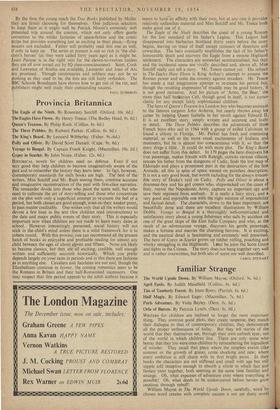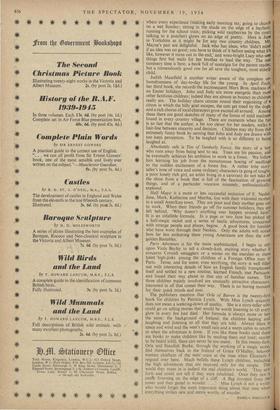Familiar Strange
The World Upside Down. By William Mayne.- (Oxford. 9s. 6(i.1 April Roots. By Judith Masefield. (Collins. 8s. 6d.) Tim of Tamberly Forest. By Irene Byers. (Parrish. 8s. 6d.) Half Magic. By Edward Eager. (Macmillan. 7s. 6d.) Paris Adventure. By Viola Bayley. (Dent. 8s. 6d.) Orla of Burren. By Patricia Lynch. (Dent. 8s. ed.) WRITERS for children are inclined to forget the most important thing.' They contrive good plots, they create suspense, they match their dialogue to that of contemporary children, they demonstrate all the proper enthusiasms of today. But they tell stories of the world that they themselves see, through their own unfresh eyes; not of the world in which children live. There are only some who betray that they too were once children by remembering the ingredient of wonder. They recall that place where the simplest events (like summer or the growth of grass), come shocking and new; where every ambition is still sharp with its first bright point. In their books the characters are not stiffened and small with age but still supple add redeptive enough to absorb a whole in which fact and fantasy exist together, both seeming at the same time familiar and strange. Oh, what expanses of adventure exist where everything is possible! Oh, what deeds to be endeavoured before heroes grow cautious through rebuff!
William Mayne in The World Upside Down, carefully, word by chosen word creates with complete success a not yet dusty world
where every experience (making early morning tea; going to church on a wet Sunday; sitting in the shade on the edge of a hayfield; running for the school train; picking wild raspberries by the river! talking to a poacher) glows on an edge of poetry. Here is June in Yorkshire as it might be for any two country children. Mr. Mayne's pair are delightful. Jack who has ideas, who 'didn't mind if an idea was no good; you have to think of it before seeing what it's like, however it turns out in the end,' and wren-bright Lucy who sees things first but waits for her brother to lead the way. The real summery time is here; a book full of nostalgia for the parent reader, but a tremendously good one for all save the toughest, most elderly
child. - Judith Masefield is another writer aware of the complete un• humdrumness of day-to-day life for the young. In April Fools, her third book, she records the inconsequent Marx Bros. madness of an Easter holidays. John and Judy are more energetic than most other fictitious children; indeed they are almost as bouncy as children really are. The holiday chaos centres round their organising of
circus in which the billy goat escapes, the cats get treed by the dogs, and a rich chorus of local characters grow excited all around. Among these there are good sketches of many of the forms of mild madness
found in every country village. There are moments when the fun is so fast that the author, a bit too' clever for her readers, walks a
hair-line between sincerity and derision. Children may shy from this extremely funny book by sensing that John and Judy are drawn with too keen perception. To be laughed with is so different to being laughed at.
Absolutely safe is Tim of Tainberly Forest, the story of a boY who runs away from being sent to sea. Trees are his passion, and
he eventually achieves his ambition to work in a forest. We follow him learning his job from the monotonous hoeing of seedlings to the sudden excitement of a forest fire. A rather trite story-
teller's tone of voice and some ordinary characters (a gang of toughs, a poor lonely rich girl, an artist living in a caravan) do not take all the shine from a book that is full of the fascination of growing things, and of a particular vocation minutely, enthusiastically. explored.
Half Magic is a more or less successful imitation of E. Nesbit. Jane, Mark, Katharine and Martha, live with their widowed mother
in a small AmerThan town. They are poor and their mother goes out to work. When their friends go off for summer holidays, they are left behind. 'Why doesn't anything ever happen around here?
It is an infallible formula. In a page or two Jane has picked LIP a half-magic nickel and a series of hectic adventures, concerned with strange people and places, begins. A good book for families who have worn through their Nesbits. Only the adults. will notice how far less endearing these young Americans are than the ever golden Bastables.
Paris Adventure is for the more sophisticated. I begin to rely upon Viola Bayley to tell a closely-knit, exciting story whether it
concerns Cornish smugglers or a winter on the marshes or these latest 'high-jinks among the children of a Foreign Office man in Paris. Tense, and for some, even terrifying, the story is well filled out with interesting details of how an English family transplanted itself and settled to a new routine, learned French, met Parisians, and found their way about in that city of familiar names. The three children mainly involved are unusually attractive characters; interested in all that comes their way. There is no boring moment for their quick minds and eyes.
The publishers mention that Orla of Barren is the twenty-first book for children by Patricia Lynch. With Miss Lynch quantity
does not mean a watering-down of quality. She is a story-teller who could go on telling stories that would be worth listening to till every glow in every fire had died. Her formula is always more or less the same; the background of Ireland ; the children leaping and laughing and listening to all that they are told. Always there is space and wind and the west's small rain and a warm cabin to return to when the adventure is done. If you like these books (and these
are books to make children like by reading them out loud; stories to be heard told), there can never be too many. In this twenty-first,
Orla and Standish Burke, through the working of a magic stone. find themselves back in the Ireland of Grace O'Malley, beloved woman chieftain of the west coast at the time when Elizabeth I reigned over here. Much befalls these Lynch children, including the high adventures that are reserved only for the simple. The world they roam in is indeed the real children's world. 'They saw forts and could not tell if they were inhabited. Once they saw a castle frowning on the edge of a cliff. A flag drooped from the tower and they gazed in wonder. . . .' Miss Lynch is not a writer who would forget the most important thing about that time when everything strikes new and seems worthy of wonder.











































































 Previous page
Previous page